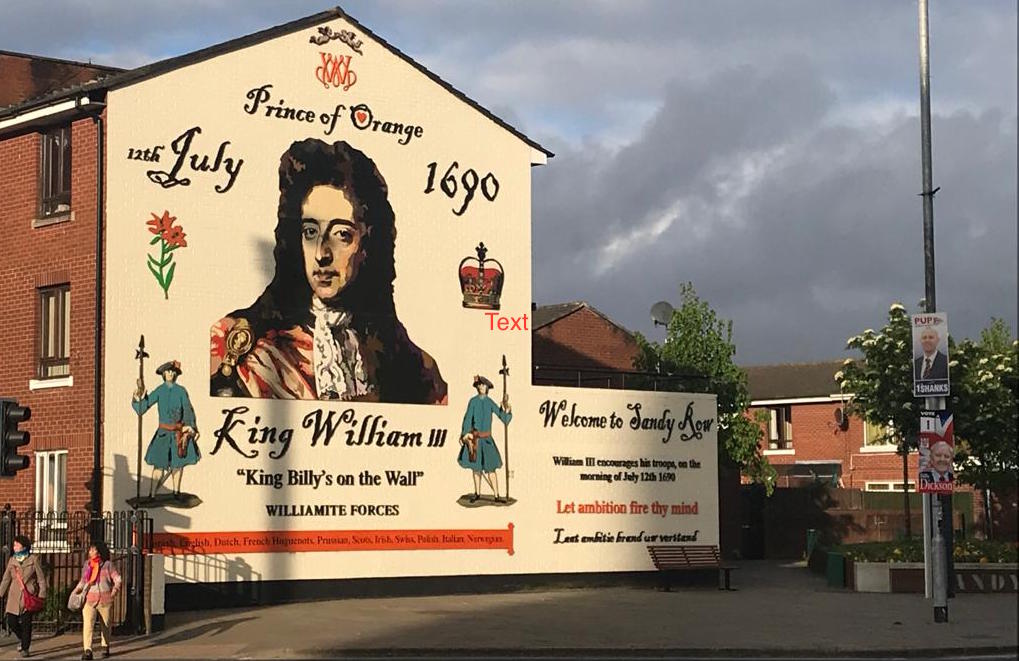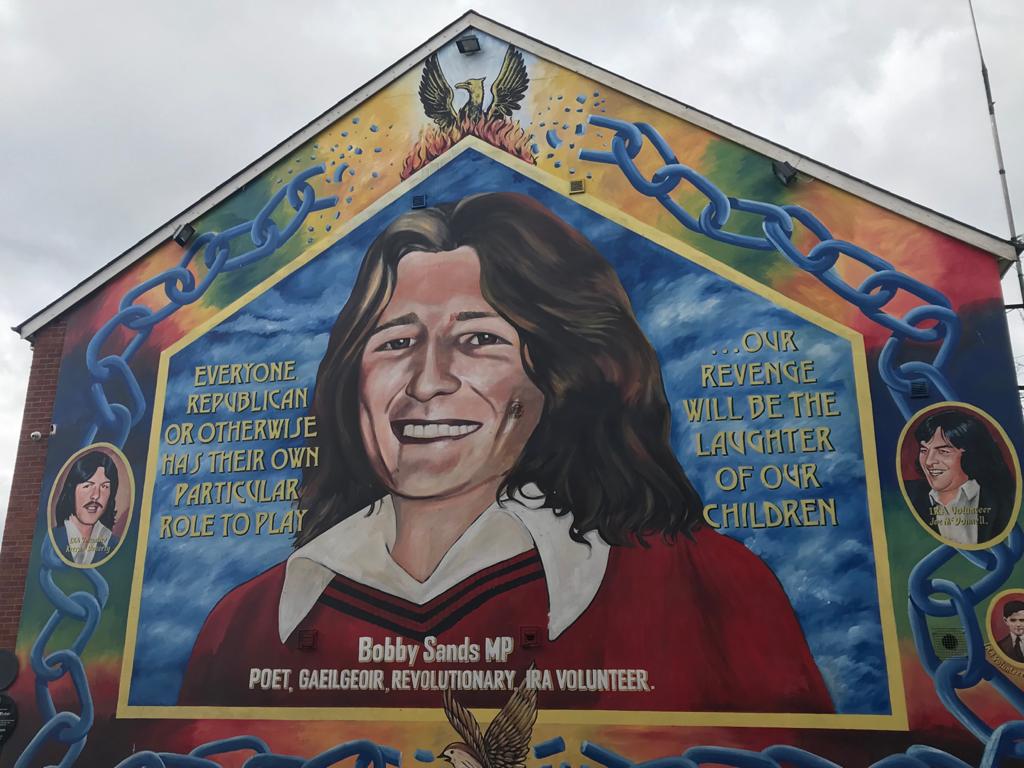The walls are crumbling … but oh so slowly
Tribal enmity still stalks the streets of Northern Ireland, but Maddy Fry finds signs of a less fraught future on the horizon.
One of the more surreal experiences I’ve had in recent years happened in Northern Ireland.
A pre-Covid trip to the Republic to stay with friends had resulted in an impromptu weekend saunter north of the border, to the village where one of my hosts boasted an impressive network of relatives. Despite the considerable physical beauty surrounding us, heavy on forests and mountains, it was a trip that wrenched me from my comfort zone.
Perhaps it was because the three of us were the only guests in the (extremely cheap) hostel in the centre of the village, or maybe it had something to do with the fact that most of the free literature next to the entrance was about ‘The Troubles’.
Perhaps it was the fact that the priest presiding over the evening Mass in the Catholic Church spent much of the homily preaching against the abortion referendum due to take place in the Republic. This seemed strange to me because, irrespective of where one might stand on the issue, people in the North could not vote in the poll.
Or it may have been the fact that the pub we ventured into was, without anyone having to say so, obviously drawing its patrons only from the Catholic community. There was even a tiny, scuffed leaflet about ‘the missions’ from the 1960s tucked away on the far side of the bar, next to a collection box for the same cause – a relic that stirred dim memories of trips to my devout grandparents’ house in days gone by. Whether or not anyone still put coins in was unclear. It probably didn’t matter.

When I voiced my curiosity later on about where the village’s Protestant community drank, the answer was simple: there were no Protestant-owned pubs, despite there being two such churches – Presbyterian and Church of Ireland – down the road.
I should stress that we were always made to feel welcome, and there was no point where I felt hostility from those we frolicked with on the Saturday evening. Indeed, our bonds were reinforced by the ice creams handed to us during our hungover shuffle into the local Gaelic Athletic Association stadium the next morning.
Yet it was hard not to sense the invisible fault lines in the ground – lines many down the decades have probably seen as permanent.
It felt like a place frozen in time, making me wonder how much Northern Ireland had really changed from its popular image across the Irish Sea of being religiously divided and sectarian, especially in the face of the chaos wrought by Brexit and its challenge to the Good Friday Agreement.
And yet, the statistics paint a picture of a changing region. For a start, religious faith – the very reality which is supposed to have created these fault lines – seems in decline. Church attendance in Northern Ireland has dropped among both Protestant and Catholic communities in recent years, with 52 percent of Catholics saying in 2017 they attend regularly – down from 81 per cent in 1981. Among Protestants, the numbers have declined from 52 per cent attending church in 1998 to 43 per cent in 2017.
It is true that the relationship between religious groups and political labels is also changing. For many years, the common perception has been that Catholics have Republican sympathies, wanting a future where the six counties of the North and the Republic in the south are brought together in a united Ireland, while Protestants tend to be Loyalists or Unionists, in favour of Northern Ireland remaining part of the UK.
The uncertainties brought about by Brexit have, on the surface, led to identity politics hardening. The threat of trade barriers between Northern Ireland and the rest of the UK has led to fears about the return of a land border, the sort that became a hated emblem of ‘The Troubles’.

These fears were prompted by concerns voiced by the EU earlier in the year that Covid vaccines might enter the UK via the Republic, in violation of export controls. Even though plans to tighten the frontier were withdrawn, it led to escalating tension between Loyalist and Republican communities.
But there are signs of a different story emerging among young people. A man from Omagh in County Tyrone, who wishes not to be named, says he is not alone in feeling that his loyalties lie with Britain, despite having been raised a Roman Catholic: “I’m a firm Unionist, but I know other Catholics who are ‘soft Unionists’, often because they are just unthinkingly in favour of the status quo. They might want eventually to see a united Ireland, but not next year or the year after. People know there would be loads of complications, including the Republic having potentially to create a new form of healthcare to accommodate the people coming from the North who have been used to a different system.”
However, he says that Brexit had done a lot to push Catholics towards a merger with the Republic: “Brexit certainly has changed the conversation as it was so poorly handled, and probably pushed people who weren’t interested before into feeling more open to unification at some point.”
He adds that ‘a lot of Unionists are scared because the prospect of a united Ireland is closer than it has ever been, even though there will be a lot of complexities involved’.
Sectarianism might still be prevalent in Northern Ireland, but he argues that “no-one really cares about the theology. There’s some overlap in the sense that less religious observance might lead to less sectarianism, but generally religion is just a cultural marker of which side you fall on.”
This is particularly prevalent when it comes to education in Northern Ireland. Demand for ‘integrated’ schooling from parents in both communities has been increasing, and families can request that a school accept both Protestant and Catholic pupils, but such initiatives are still rare. Examples include Drumragh Integrated College and the planned Strule Shared Education Campus, which aims to have schools for both communities housed on one site with their pupils using shared facilities. Yet the man from Omagh, where both schools are based, claims that the latter has still been a lightning rod for local tensions.
“The site where Strule is due to be built used to be a British army barracks, and Sinn Fein has been keen to take that land away from the military. I think it’s meant to be ‘two fingers’ to the Brits because it gets the army out. Other schools in the area like Drumragh College have since been under pressure not to draw pupils away from Strule. It’s a classic piece of Northern Irish politics.”
On the Protestant side, there have also been some worrying trends for those wishing to preserve the Good Friday agreement. A museum on two sites celebrating the legacy of the ultra-Protestant group the Orange Order, the Museum of Orange Heritage in County Armagh and East Belfast, opened in 2015 with the aim of promoting and celebrating the group’s controversial legacy, which has often been steeped in anti-Catholic sectarianism.
There have also been controversial statements from the Democratic Unionist Party (DUP) voicing their opposition to laws that would protect and promote the Irish language, possibly fed by a growing awareness that the Protestant community in Northern Ireland is ageing, and most people of school age are Catholic. For the first time since 1921, Unionists are currently the minority in Stormont (the seat of the Northern Ireland Assembly).

Yet there has been evidence to suggest that young people who see themselves as Unionists are turning away from the party made famous by the larger than life Protestant leader the Rev Ian Paisley, whose infamous roars of ‘never, never, never’ neatly summed up his followers’ approach to further integration between Northern Ireland and the Republic.
A woman from Ballymena in County Antrim, who also chose to be anonymous, affirms this with the emphatic statement:
“Being Protestant for me has absolutely nothing to do with religion or God – I am Protestant because of where I was raised.”
She clarifies further: “I am not religious, but if asked I will automatically tell you I am Protestant.”
Like the man from Omagh, she says that Brexit has changed things, making her feel more distant from her upbringing: “It had nothing to do with actual religion, but I grew up in the heart of ‘DUP land’. We were Protestant and supported the DUP – not because they were right, but because they weren’t Sinn Fein and the other parties weren’t big enough to keep them out of power. However now that we are post-Brexit I find myself with an Irish passport, more amenable to a united Ireland so as to rejoin the EU, and my British passport has been left to expire.”
And she adds: “I do consider myself Northern Irish, Irish and British altogether. That’s far more important and meaningful than being Protestant or Unionist.”
Activist Linda Ervine, head of the Turas project at the East Belfast Mission, which works to spread and celebrate the Irish language among Belfast’s Protestant community, says that what religion means to people has changed a lot in her lifetime.
“Most people from the Protestant community don’t attend church. There’s almost a superstitious sensibility now among Catholics as well as Protestants, in that you still have to get a child christened, you go to church to get married because it’s something that you do, even if you have no actual faith.”

She also said that the terms ‘Protestant’ and ‘Unionist’ used to be ‘interchangeable, but young people are increasingly questioning and helping to erode the old tribal allegiances.
A sign of this could be how well the Protestant community has responded to the Turas project. They make up 60 per cent of those who attend Irish language classes, which are held three nights a week. The Thursday class regularly attracts over 100 people.
Turas also funds a scholarship that so far has sent nine people to university to study Irish at a higher level. Ervine claims their efforts are ‘changing the narrative around why people speak Irish and who Irish belongs to’, and shows that there’s “a lot of diversity in the Irish-speaking community.
“You don’t need to be from one political persuasion to speak Irish.”
However, Brexit has fuelled mistrust, which Ervine says is fed by Stormont: “Brexit has made the old sectarian lines harden and increased the sense of threat. People can see you as a traitor and it can make you feel unsafe, even though we can’t collude with such hatred and mistrust between communities. Stormont puts out a message that’s full of suspicion and distrust and dislike, and tells people to feel threatened by different political parties and communities.”
This might suggest that some of the old walls are still standing, even while others crumble.
The rioting in West Belfast in April in the wake of news over a possible trading border in the Irish Sea, which Unionists claimed would threaten Northern Ireland’s place in the UK, saw community tensions flare up in a way most people hoped was long gone. It was further exacerbated by the decision not to prosecute Sinn Fein leaders who breached Covid rules to attend the funeral of former IRA member Bobby Storey last year.
Theology might matter to people less and less, and levels of sectarianism are far from what they were during the height of the Troubles. Yet as the man from Omagh puts it: “Sectarianism is still there and it still dominates how people see things in Northern Ireland. There is a reasonably strong undercurrent that could come to the fore much more.”
Hope seems to lie with Northern Ireland’s youth, who increasingly seem to be spurning the labels which defined their forebears.
In a pleasing irony, their peers across the sea are so often accused of being obsessed with identity politics, with all the barriers this creates; yet beyond the headlines, the current generation in Northern Ireland could face a less divided future.
Enjoy this article by Maddy Fry? Read another one of her recent pieces for Adamah Media, this time on the changing shape of journalism, by clicking here.
Like what you’ve read? Consider supporting the work of Adamah by making a donation and help us keep exploring life’s big (and not so big) issues!
2 Comments
Cecilia McCabe
A very well timed article and illuminating article. I find there is too much simplification and search for sensation ’ in the mainstream UK press on this topic. I would like to donate to Adamah but do not have a PayPal account. Is it possible to donate by card?
Well done with the free thinking journalism.
Tascha von Uexkull
Hi Cecilia, thank you so much for your comment – we’re really glad that you’re enjoying our articles and recognising our vision. You can donate by card by following this link: https://www.paypal.com/donate/?cmd=_s-xclick&hosted_button_id=QRFSWWB6GKWBW&source=url but if you have any issues please feel free to email tascha.von.uexkull@adamah.media and I can sort out an alternative arrangement. Thank you so much for your support, it really does make a difference! Best, Tascha (managing editor of Adamah Media)